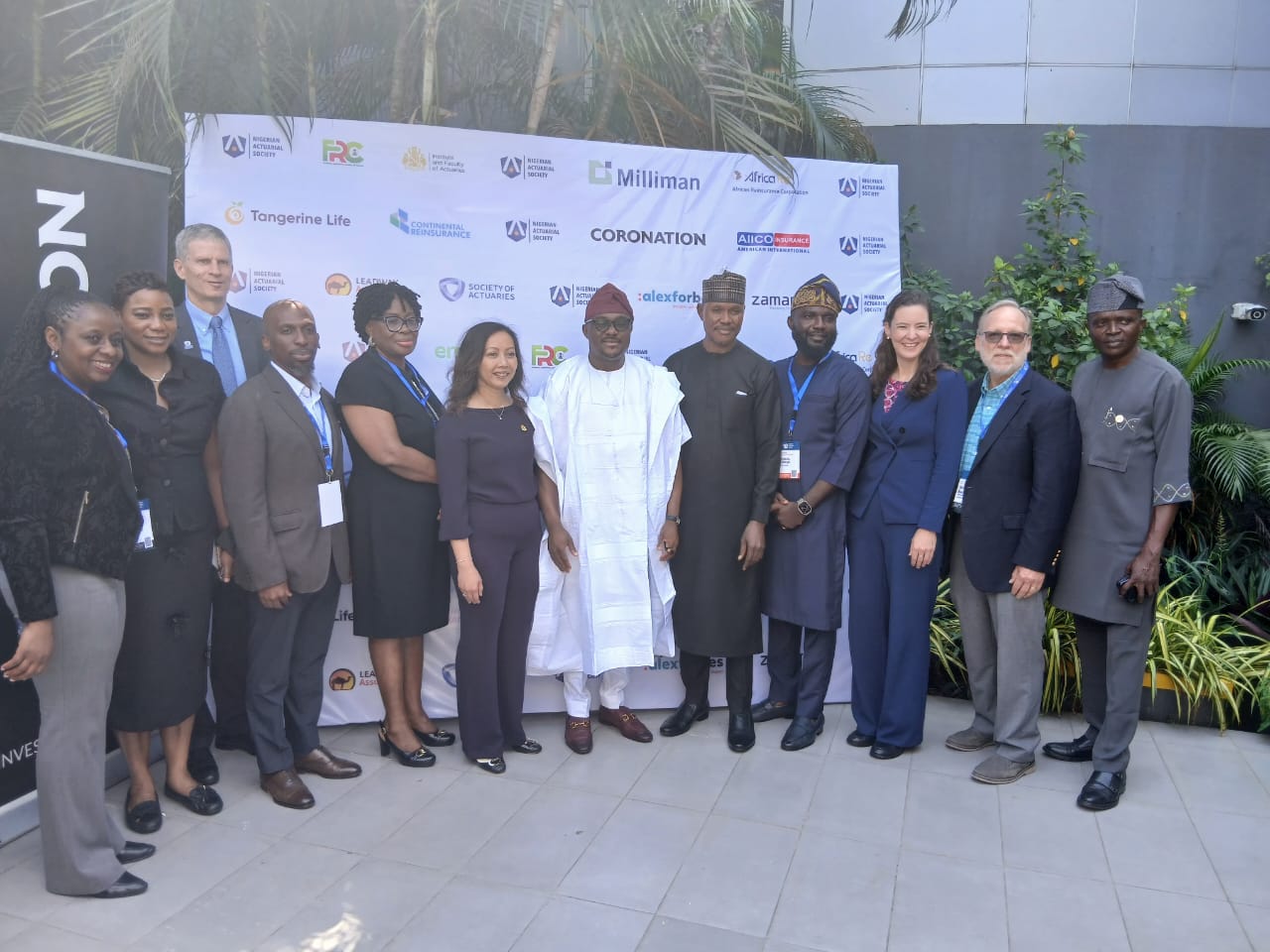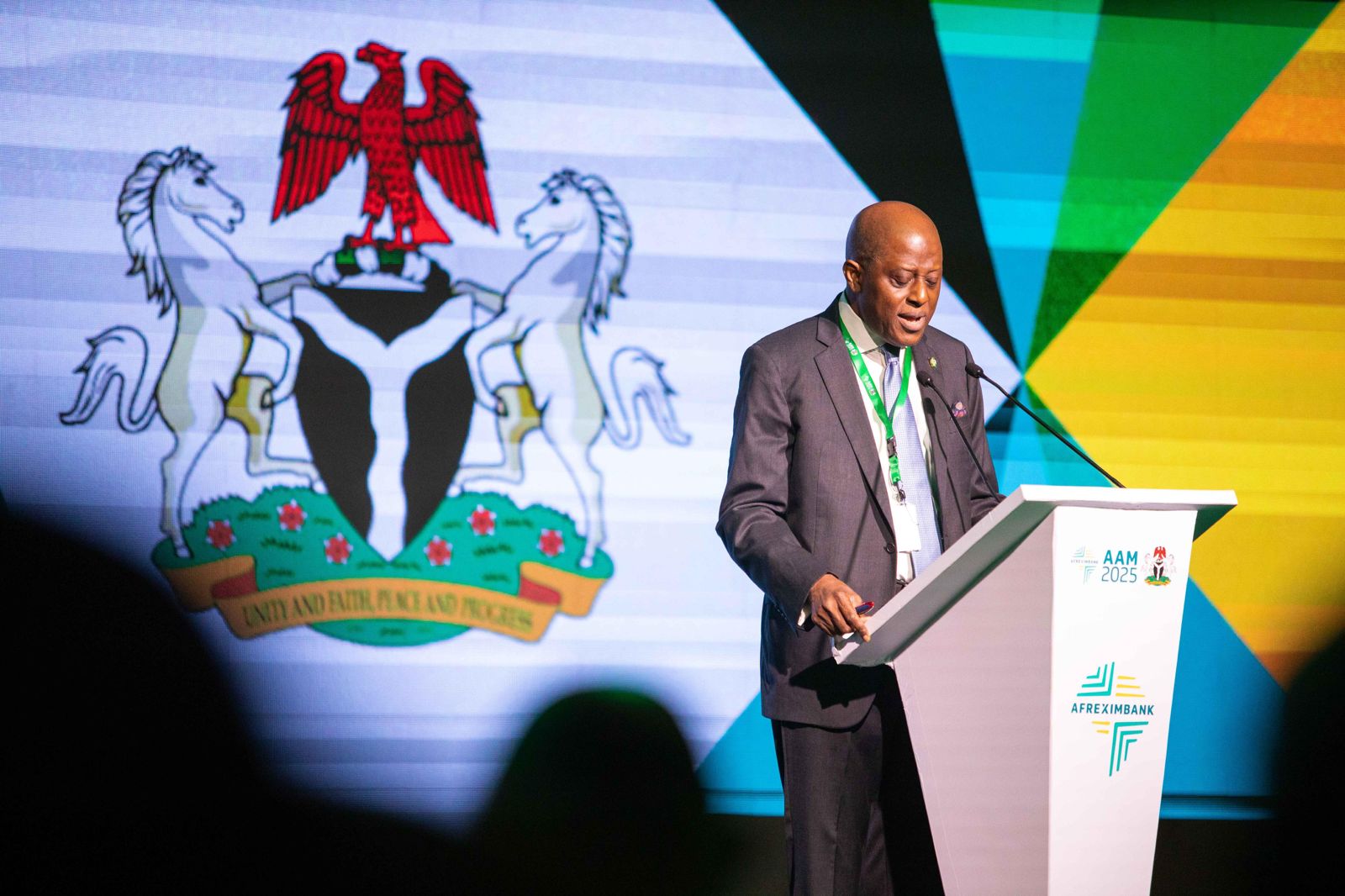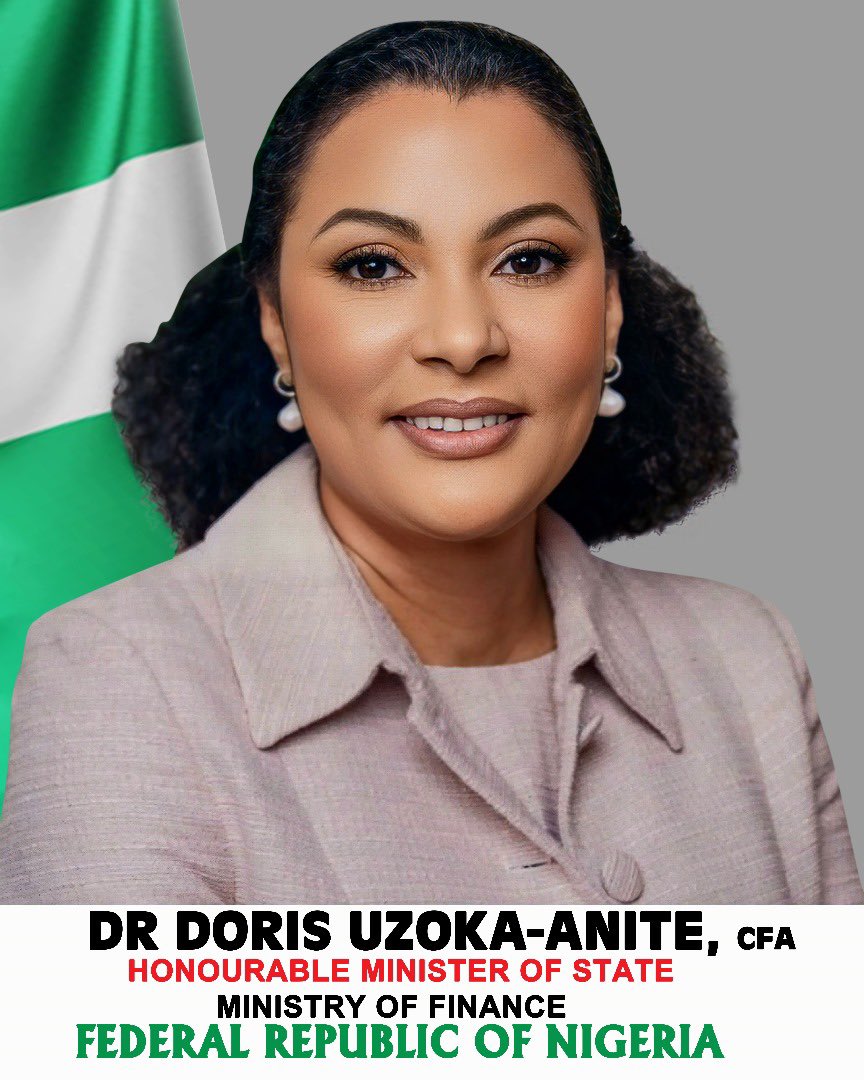NAICOM, FRC charge actuaries on product design innovation, risk management
By Taiye Olayemi
The National Insurance Commission (NAICOM) has urged actuaries to design effective risk management strategies and develop products that meet society’s evolving needs.
Mr Olusegun Omosehin, Commissioner for Insurance and Chief Executive Officer of NAICOM, made the call at the 2025 Annual Conference of the Nigerian Actuarial Society (NAS) on Wednesday in Lagos.
The News Agency of Nigeria (NAN) reports that the conference, which brought together professional actuaries, insurers, academics, and students, has the theme: “Creating Value and Building Resilience in an Evolving Industry”.
Omosehin, represented by Dr Usman Jankara, Deputy Commissioner (Technical), NAICOM, stated that as the industry faces challenges such as climate risk, cyber threats, and health system vulnerabilities, the actuarial profession must continue to innovate and lead.
He noted that actuaries play a critical role, as their expertise in risk modeling, data analytics, and long-term financial planning is essential to ensuring that insurance products remain sustainable, inclusive, and responsive to major risks.
Omosehin said that the conference’s theme remained relevant as the Nigerian insurance sector continued to undergo significant transformation driven by technological innovation, shifting consumer expectations, and evolving regulatory frameworks.
He said, “It is reassuring to note that the industry has shown tremendous resilience and growth. As of Q1 2025, Nigeria’s insurance sector recorded a 63 per cent increase in gross premium income compared to Q1 2024, reaching N769.2 billion in just the first three months of 2025.
“This growth reflects market confidence and increasing relevance of insurance in the Nigerian economy. In the same period, the industry’s total asset stood at N4.12 trillion, underscoring a stronger financial foundation of the industry.
“These figures represent a positive improvement in the industry’s loss ratio when compared to Q1 2024, it also represents 89.1 per cent of total reported things, indicating improved responsiveness of the industry to stakeholders.”
According to him, NAICOM was committed to fostering a regulatory environment, supporting innovation, protecting policy makers, ensuring transparent processes, and promoting long-term industry sustainability.
He said that the commission was committed to strengthening supervisory framework, encouraging digital transformation and supporting inclusive insurance movement.
“Given Nigeria’s youthful tech savvy population, Nigeria is well positioned to lead in digital insurance.
“To seize this opportunity, we must invest in talent, or put global standards, and foster a culture of continuous learning and ethical leadership, while exploring new opportunities such as insurance,” he said.
The CFI said as part of NAICOM’s strategy, the guidance for insure -tech operations in Nigeria had been concluded and about to be issued.
He added that the commission had also launched the Actuarial Capacity Development Initiative, which is intended to build actuarial talent and efforts on going to India.
The commissioner, however, noted that there were a lot of challenges, including funding, but the commission was actively engaging development partners, such as the Afrikari Foundation, GIZ, UNDP, and other international donors to secure funding and support for the initiative.
Omosehin said, “While these efforts are ongoing, it has become imperative for the Nigerian insurance industry to fight this and commit to funding actuarial capacity development in Nigeria.
“I therefore call on all stakeholders, particularly insurers, actuaries, and educators, to continue to work together to build a resilient industry that is inclusive and value driven.
“We must continually champion policies that support actuarial development, encourage research, and ensure that our industry remains a pillar of economic stability and social protection.”
Also speaking, Dr Rabiu Olowo, the Executive Secretary and CEO of the Financial Reporting Council (FRC) of Nigeria, called for collaboration, purpose value creation and financial resilience in the industry.
Olowo said across the globe, people continue to witness profound shifts in how value is measured, risk is assessed and how systems respond to the rapid changes.
He said this also included the rise of artificial intelligence to climate uncertainty, sustainability reporting, graphical realignment to the evolving nature of managerial products in markets.
Olowo emphasised the role of actuaries in navigating uncertainty, guiding long-term decisions, and building sustainable systems through its deep foundations in mathematics, risk modeling, and financial foresight.
He said that stakeholders must fully leverage expertise of actuarial professionals to create value and resilience for the society, especially in Nigeria and in Africa.
“We recognised that for Nigeria to build a resilient and competitive economy, we need a robust pipeline of Actuarial experts.
“Nigeria currently has fewer than 30.5 actuaries while an economy which is similar to ours, South Africa, has about 2,000.
“This is a capacity gap that directly affects our ability to manage pension funds, price risks, value liabilities, and our ability to attract and retain investment.
“We are committed to building Nigeria’s Actuarial capacity and aligning with global standards.
“As a regulator, we depend on artuaries to help answer difficult questions. How do we value assets in an increasingly intangible economy?
“How do we protect public interest with fostering innovation? How do we integrate risks, sustainability, and resilience into the long-term economic planning of our nation and our organisation?
“These are the frontiers where Artuarial science must operate, and these are the challenges we must tackle together,” he added.
In his address, the President, Nigerian Actuarial Society (NAS), Mr Jolaolu Fakoya, who noted the critical role actuaries played in shifting a strong future for the economy, emphasised need for resilience in the industry.
“As we navigate an economy marked by uncertainty, disruption and transformation, the core to create value and view resilience is more than just a thing. It’s a professional imperative.
“As actuaries, our role goes beyond analysis. It extends to leadership, stewardship and innovation.
“Our profession is a calling to view resilience, to equip businesses and institutions to thrive and maintain integrity and change.
“Over the next two days, we’ll explore big ideas and practical tools through sessions such as VisualTech, AI Workshop, and a lot of other engaging topics that we are blind of,” Fakoya said.
In his remark, Mr Babatunde Fajemirokun, Managing Director, AIICO Insurance Plc, who spoke on how Insurtech impact value creation, called for strategic partnership in driving innovation and leveraging digital platforms.
Other speakers at the conference reiterated the need for resilience and collaboration to meet needs within the industry and also provide a lot of cover for customers. (NAN) (www.nannews.ng)
Edited by Olawunmi Ashafa
Tinubu to sign 4 tax bills into law, Thursday
By Muhyideen Jimoh
President Bola Tinubu will on Thursday sign into law, four critical tax reform bills aimed at transforming Nigeria’s fiscal and revenue framework.
The Presidential Spokesperson, Mr Bayo Onanuga, disclosed this in a statement on Wednesday in Abuja.
The News Agency of Nigeria (NAN) reports that the bills are: The Nigeria Tax Bill, The Nigeria Tax Administration Bill, The Nigeria Revenue Service (Establishment) Bill and the Joint Revenue Board (Establishment) Bill
The bills were passed by the National Assembly following extensive consultations with various interest groups and stakeholders.
Onanuga said once enacted, the new tax laws are expected to significantly improve tax administration in the country.
He said they are also projected to enhance revenue generation, improve the business environment, and boost both domestic and foreign investment.
According to him, the Nigeria Tax Bill (Ease of Doing Business), aims to consolidate Nigeria’s fragmented tax laws into a harmonised statute
He said by reducing the multiplicity of taxes and eliminating duplications, the bill seeks to enhance the ease of doing business and reduce taxpayer compliance burdens.
”The Nigeria Tax Administration Bill, the second piece of legislation, will establish a uniform legal and operational framework for tax administration across the federal, state, and local governments.
“The third bill, the Nigeria Revenue Service (Establishment) Bill, repeals the existing Federal Inland Revenue Service Act and establishes a more autonomous, performance-driven national revenue agency— the Nigeria Revenue Service (NRS).
The fourth bill, the Joint Revenue Board (Establishment) Bill, provides for a formal governance structure to foster cooperation between revenue authorities at all levels of government.
It will also introduce essential oversight mechanisms, including the establishment of a Tax Appeal Tribunal and an Office of the Tax Ombudsman,” he said
Onanuga said the historic signing ceremony at the Presidential Villa, Abuja, will be witnessed by the Senate President and the Speaker of the House of Representatives.
Other attendees will include the Senate Majority Leader, the House Majority Leader, the Chairmen of the Senate and House Committees on Finance.
The Chairman of the Nigeria Governors’ Forum, Chairman of the Progressive Governors’ Forum, Minister of Finance and Coordinating Minister of the Economy, and the Attorney General of the Federation will also be in attendance (NAN) (www.nannews.ng)
Edited by Rotimi Ijikanmi
Make MSMEs funds revolving to grow sector- NASME president urges FG
By Lucy Ogalue
The Nigeria Association of Small and Medium Enterprises (NASME) has called for the institutionalisation of intervention funds as revolving schemes to ensure sustainable financing for Micro, Small and Medium Enterprises (MSMEs) in Nigeria.
Dr Abdulrashid Yerima, President of NASME, made the call during a panel discussion at the ongoing 2025 MSME Forum in Abuja.
Yerima said that the practice of disbursing intervention funds as one-off measures was not sufficient to address the long-term challenges faced by MSMEs, especially in a volatile economic environment.
“What we are advocating for is a revolving fund mechanism. Intervention funds should not be one-time disbursements.
“They should be structured in a way that ensures continuity, so that when one group benefits and repays, another group can also access the same opportunity,” he said.
Yerima said that government intervention through the Bank of Industry (BOI) and other platforms had positively impacted businesses in the past.
He, however, said that there was the need to scale up and sustain such efforts through long-term planning.
The NASME president also called for a national MSME financing framework that aligned with Nigeria’s industrial, trade, and youth employment strategies.
He said that donor funds and public resources should be leveraged to de-risk private capital, allowing blended finance models that could attract more private sector participation in MSME funding.
According to him, the newly established Credit Guarantee Company is a welcome development and comes at a critical time for small businesses.
“The credit guarantee scheme is essential, especially as MSMEs are considered high-risk by conventional lenders.
“We believe that with appropriate support, these businesses can thrive and repay loans, making the fund sustainable,” he said.
He also urged financial institutions such as BOI and the Credit Corp to simplify their loan requirements and ensure that MSMEs were adequately prepared to access available financial products.
Yerima emphasised the need for targeted support to critical sectors like agriculture, manufacturing, logistics, and services, stressing the interconnectedness of these industries in building a resilient economy.
He called on the government to subsidise and capitalise MSME funds, ensure low interest rates around three per cent, and invest in capacity building to improve loan repayment and business sustainability.
On regional cooperation, Yerima advocated for the development of cross-border financing tools to support MSME trade across Africa under the African Continental Free Trade Area (AfCFTA).
“We are engaging with other SME associations across ECOWAS and beyond to ensure that African MSMEs are not left behind in the drive for regional integration and trade,” he said.
The Executive Director of Operations at Credicorp, Mrs Nike Kolawale, reiterated the importance of collaboration between state-level MSME leaders and Credicorp to drive grassroots engagement.
Kolawale said that Credicorp was working to establish a robust national credit rating and verification infrastructure to support small businesses and ensure transparency in credit administration.
“There will be a central credit system for the entire country. It will take time, but we are determined to get there,” she said.
Mr Peter Shivute, Executive Director for MSME Development and Export Promotion, Namibia Investment and Development Board, said that unity among African economies would ensure real progress in trade and development.
Shivute reflected on historical and political ties between African countries, citing past collaborations between Namibia and Nigeria as a foundation for stronger economic integration today.
“If we do not leverage ourselves together, just like these three institutions on this stage are committing to work together, we will not get anywhere,” he said.
Shivute highlighted Namibia’s natural advantages in solar energy and emerging industries such as hydrogen.
He emphasised the need for regional economies to pool resources and industrialise strategically.
He called for smarter trade policies under the African Continental Free Trade Area (AfCFTA), including the development of local manufacturing hubs to process imported components and reduce overreliance on foreign markets.
“We must build 50 per cent of the components locally, create jobs, and still export under the trade frameworks.
“Those products are coming anyway, it is up to us whether we produce them or not,” he stated.
Shivute also urged the continent to adopt modern technologies in traditional sectors like agriculture and finance, adding that Nigeria remained a model for digital innovation in Africa.
“The promise of AfCFTA is real, but it needs aggressive execution.
“The bureaucracy will always be there, but unless we are bold about our goals, we will not get results,” he said.
Mrs Ogo Akabogu, Divisional Head of North Central, BOI. also expressed the bank’s commitment to the growth of the sector.
Akabogu said that BOI was exploring ways of shortening the turnaround time of assessing its loans for the betterment of small business owners. (NAN)(www.nannews.ng)
Edited by Kadiri Abdulrahman
AfCFTA: Cardoso calls for greater cohesion among African countries
By Okeoghene Akubuike
Mr Olayemi Cardoso, Governor of the Central Bank of Nigeria(CBN), says fostering greater strategic cohesion among African countries will secure Africa’s future.
Cardoso said this at the African Export-Import Bank (Afreximbank) 32nd Annual Meetings(AAM2025) in Abuja on Wednesday.
He said this should be done by accelerating the implementation of the African Continental Free Trade Area (AfCFTA) treaty, deepening regional integration, and building robust engagement with the African diaspora.
“To secure the future that we envision, we must foster greater strategic cohesion among African member states, “he said.
Cardoso commended the African Executive Panel for their work in redefining the meaning of diaspora and forming partnerships with the African diaspora which include the Caribbean.
He emphasised the importance of Afreximbank in promoting African trade and economic development.
Cardoso noted that the bank had emerged as a trusted partner, a convener of ambition, and a catalyst for change, shaping strategy, enabling execution, and elevating African agencies across the globe.
He noted that Nigeria had received approximately 52 billion dollars in trade and project financing over the past decade, mirroring both the size of the Nigerian economy and the depth of engagement with Afreximbank.
The Governor highlighted the bank’s impressive financial results, including its expansion from an initial capital base of 750 million dollars to over 40 billion dollars as of 2024.
He also commended the bank’s crisis preparedness, strategic foresight, and clear communication, which have enabled it to navigate challenges and thrive in a rapidly changing global environment.
“The celebration of Afreximbank’s 32 years of resilient growth and transformation is a testament to its commitment to promoting African economic development and its potential to shape the continent’s future.”
Cardoso said it was important to recognise the challenges facing the continent which include rising trade protectionism, global economic fragmentation, and shifting geopolitical dynamics
“These. not only undermining Africa’s developmental prospects, they are also threatening the coherence of the international ecosystem.”
Looking to the future, the governor called for even greater ambition and clarity of purpose.
He emphasised the need for green growth, digital transformation, food and energy sovereignty, and a dynamic private sector that drives opportunity, innovation, and inclusive prosperity at scale.
“Afreximbank has helped us dream big. Now it is time to deliver big. Let us commit to building the resilient institutions our people need.
“Our economies will expire, and our continent will serve, let us live here today not only inspired by the past, but united in the work that lies ahead.”
Cardoso announced the introduction of two financial products, the Non-Resident Nigerian Ordinary Account and the Non-Resident Nigerian Investment Account, designed to serve Nigerians living abroad.
He said they would also provide a secure and efficient platform for managing funds and investing in the Nigerian financial markets.
The News Agency of Nigeria (NAN) reports that the meetings, which has the theme “Building the Future on Decades of Resilience,” focus on accelerating trade opportunities, driving investment, and fostering innovation. (NAN)
Edited by Vivian Ihechu
Nigeria’s emerging tax regime responsive to taxpayers’ concerns- Minister
By Kadiri Abdulrahman
Nigeria is building a tax administration that will be effective in revenue mobilisation and also responsive to challenges faced by tax payers.
The Minister of State for Finance, Dr Doris Uzoka-Anite said this on Tuesday in Abuja, at the TaxADR Roundtable, with the theme “unlocking Revenue and Strengthening Dispute Resolution: A Roadmap to Tax ADR in Nigeria”.
The minister was represented by Mrs Ndidi Chineyolum, a director in the ministry.
According to her, Nigerians are living in a time when the imperatives of economic reform, inclusive growth and sustainable public finance demand more innovative and operative approach.
She said that collaboration in the resolution of tax disputes captured the essence of what is required to build an efficient tax administration.
“It speaks directly to the fundamental values that underpin a modern progressive tax system, mutual trust between taxpayers and the authority, procedural fairness in enforcement and administrative efficacy in resolving disputes.
“More than just a slogan, this theme challenges us to reflect on how we can bridge the gap in understanding, reduce adversarial interactions and foster a culture of dialogue and accountability.
“It underscores the need for us all, especially the government, and other stakeholders to create a system where disputes are resolved not through prolonged confrontation, but through seizing and raising a timely consensus,” she said.
The minister said that as a nation striving to broaden its non-oil revenue base, tax compliance remained both a strategic priority and an existing challenge.
“With the global shift away from commodity dependence, Nigeria must strengthen its domestic revenue capacity to sustain national development.
“Over the past decade, the landscape of tax disputes has become increasingly complex, both in volume and in nature of issues arising from a growing business model and regulatory framework.
“The adversarial nature of traditional litigation often results in prolonged resolution timings, escalating legal expenses and strained relationships between taxpayers and revenue authorities,” she said.
She said that the situation not only delayed revenue collection, but also brought in a climate of uncertainty and tension within the tax equity play.
“Such friction undermines more than just revenue modernisation.
“It weakens investor confidence, erodes public trust, disrupts the foundation of a stable and predictable fiscal environment ” she said.
The Attorney-General and Minister of Justice, Lateef Fagbemi, said that it was imperative for Nigeria, like any other country to expand its revenue base through taxation.
Fagbegbi, who was represented by Oloyede Hussein, Special Adviser to the President on Arbitration, Drafting and Resolution, said it was important to enhance compliance and build public trust in the country’s tax systems.
“But we must not do so through coercion or confrontation, but by fostering a tax culture rooted in fairness, dialogue and accountability.
“This is where the Alternative Dispute Resolution (ADR) comes in.
“In international context, ADR has long been recognised for its efficiency, cost-effectiveness and ability to preserve relationships. These are the very values we must infuse into our tax system,” he said.
He urged taxpayers to always expect these arguments to arise, they can explore dialogue and a commitment to resolution over conflict.
“This roundtable offers us an opportunity to learn from the international best practices,” he said.
Mr Lateef Yusuff, the Founder and Convener of the TaxADR roundtable said that the gathering brought together stakeholders from across governments, the private sector, academia and the international community.
Yusuff said that the purpose was to consider how best to embed ADR into Nigeria’s tax landscape.
“This roundtable is especially timely, coming on the heels of several landmark developments ” he said.
He cited the recent reform of Nigeria’s tax legislation, the enactment of the Arbitration and Mediation Act and the National ADR policy as instances of such landmark developments.
“Together these developments provide a strong legal and policy foundation for the integration of ADR into Nigeria’s tax system, ” he said.
Anita Erinne, the Coordinating Secretary. Tax Appeal Tribunal, expressed the readiness of the committee to improving access to justice in tax disputes.
Delivering a keynote address on new tax reforms and the role of ADR, Erinne said that tax disputes affected the bottom line of government, and also the livelihoods of citizens and the fortunes of businesses.
“We will encourage collaborative tax administration. We will now contribute a great deal to the rule of law, economic stability and national development.
“I also recognise the fundamental role of the Federal Inland Revenue Service (FIRS) in championing a more responsive and modern tax system.
“The FIRS has shown willingness to engage in reforms, and I commend the Executive Chairman, Dr Zacch Adedeji, for sharing this vision and supporting the implementations of tax ADR in Nigeria,” she said.
Erinne said that Nigeria was undergoing a digital transformation of its tax system.
According to her, the tax rate is currently at about 13 per cent.
“A tax system is built on both taxation and collaborative action, flexibilities in efficiency and public responsibility,” she said. (NAN)
Edited Ese E. Eniola Williams
FG revenue hits N6.9trn in Q1
By Nana Musa
The Minister of Finance and Coordinating Minister for the Economy, Mr Wale Edun, says Federal Government revenue rose to N6.9 trillion in the first quarter.
Edun made this known on Monday during the Citizens and Stakeholders’ Engagement on implementing President Bola Tinubu’s priorities for the second quarter, held in Abuja.
He stated that the figure was higher than the N5.2 trillion recorded in the previous quarter, marking a 40 per cent increase.
According to him, increased transparency and openness in revenue collection and remittance contributed significantly to the improved earnings.
“In the first quarter of 2025, we realised N6.9 trillion, which is up from N5.2 trillion in the same period last year,” he said.
He explained that the 40 per cent increase was largely due to recent adjustments, including those related to the exchange rate.
The minister reaffirmed the government’s resolve to block financial leakages and use automation and technology to boost revenue collection.
He noted that fiscal discipline had improved, with debt service to revenue ratio dropping to 60 per cent from a previous high of 150 per cent.
“As of now, there is no resort to ways and means. Debt service to revenue stands at around 60 per cent by end of 2024,” he added.
He stressed government’s commitment to transparency, particularly in ensuring consistency of fiscal data across official platforms.
“If you check the Accountant-General’s website, figures may differ in presentation but align with Budget Office data when reviewed,” Edun said.
He emphasised the importance of data integrity, saying credible fiscal figures are critical to accountability in public finance.
Edun said that the enabling environment created by the government had attracted major investments into Nigeria’s economy.
He cited Shell’s recent $5.5 billion investment commitment in oil production, noting increased investor confidence due to policy stability.
“This third phase aims to drive investment in agriculture, manufacturing and services to boost productivity,” he said.
He added that such investment would help grow the economy, generate jobs, and ultimately reduce poverty across the country.
According to him, the economy is now moving in the right direction, with clear signs of positive change.
“Real GDP growth is on a steady path, but 3.4 or even 3.8 per cent is not the ultimate target,” he said.
He stressed that the President’s goal is to achieve sustainable GDP growth of about seven per cent annually.
Such growth, he said, would surpass population growth and help lift millions of Nigerians out of poverty.
The minister also emphasised the importance of curbing inflation, stating: “We are on the right trajectory.”
Chief Executive Officer of the Ministry of Finance Incorporated (MOFI), Dr Armstrong Takang, said MOFI manages public wealth for optimal returns.
Represented by Director Tajudeen Ahmed, he said MOFI aims to generate revenue to support Nigeria’s budgetary needs and secure future generations.
He revealed that assets under management had risen to N38 trillion from just 20 company accounts reviewed so far.
“We expect the figure to rise significantly as we complete reviews of all portfolio companies,” he said.
Takang outlined MOFI’s three key pillars, starting with enhanced visibility of federal government assets and their respective values.
The second pillar is professionalising portfolio companies to ensure proper management and increased value creation.
“Many of these companies are poorly managed. We must improve their governance and performance,” he noted.
The third pillar involves capital mobilisation, attracting investors with guarantees and de-risked opportunities in Nigeria.
“Investors are assured of good returns on their investments in Nigeria,” Takang said.
He also announced the creation of a National Asset Register accessible on the Finance Ministry and MOFI websites.
“This register will detail asset values, locations, and ownership – a major milestone for transparency,” he said.
Takang added that significant progress had been made in building the online asset register. (NAN)(www.nannews.ng)
Edited by Kamal Tayo Oropo
Equity market opens bullish with N279bn gain
SEREC urges FG to impose taxes on unreturned container in ports
By Diana Omueza
The Sea Empowerment and Research Centre (SEREC) has urged the Federal Government to impose taxes on empty unreturned containers especially rickety ones to decongest the ports.
Mr Eugene Nweke, Head Researcher at SEREC, made the call at a news conference on Monday in Abuja.
Nweke said that imposition of taxes or fees on empty unreturned containers was in line with global shipping laws and practices to reduce container dumping, enhance safe environment and boost revenue.
“Today shipping companies charge the Nigeria Shippers in the average of ₦10,000 per day for demurrage after the third period.
“Several countries have implemented taxes or fees on unreturned containers after a specified period.
“Germany, France and the UK have implemented container detention fees or demurrage charges for unreturned containers.
“The United States has a similar system with container shipping lines charging detention fees for containers held beyond the allowed free time.
“Imagine if the government places a demurrage tax on percentage basis, to every unreturned empty container in our ports, how much revenue government will generate from that window alone?
Nweke said that based on research, revenues that could be realised from unreturned container taxes could revive the ports, modernise it and ensure proper maintenance.
He said that without the implementation of these shipping laws, Nigeria would continue to entertain containers littering its ports and with huge financial implications.
Nweke noted that the health and environmental hazards unreturned empty containers pose to the environment were much.
According to him, abandoned containers pose environmental and health hazards, particularly if they are rickety or unseaworthy.
“To mitigate these, it is reasonable for Nigeria to consider implementing these taxes and fees for prompt return of empty containers and reduce the financial burden on shipping lines.
“We have proposed the need for the establishment of a strategic container return system, jointly coordinated or administered by the Nigerian Shippers Council (NSC), Nigeria Port Authority (NPA), among others,” he said.
He encouraged Nigerian businesses to boost exports to balance the number of empty containers and reduce the financial burden on shipping lines.
Nweke also advised the government to invest in better port infrastructure and management systems to streamline container handling, reduce congestion and enhance tracking and return logistics.
He recommended the establishment of an effective container return systems to minimise the number of empty containers left in our ports and reduce storage costs. (NAN)(www.nannews.ng)
Edited by Francis Onyeukwu














